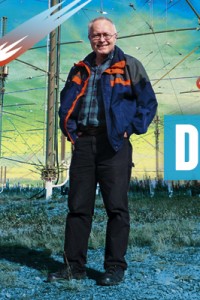Cory Doctorow: Rules for Writers

In 1991, I read two documents from Bruce Sterling that changed the course of my professional and literary career. The first was “The Turkey City Lexicon”, which Sterling co-wrote with Lewis Shiner, an online classic that was finally published between covers in the 1991 Pulphouse edition of The SFWA Handbook, which I received in the mail with my newly minted SFWA membership kit.
The second was a print classic that became an online classic: Bruce Sterling’s debut non-fiction book The Hacker Crackdown, which I read as an advance bound copy that the publisher’s rep dropped off at Bakka, the science fiction bookstore where I worked, and which I snaffled before anyone else could touch it.
Two works affected my life in profound but separate ways, which only came together last September, on a cruise ship in the Caribbean, while I was teaching on the Writing Excuses Cruise.
Allow me to explain.
The Turkey City Lexicon is a glossary of SF critiquing terms that emerged from the Turkey City Workshop, founded in 1973, and still running to this day. The Lexicon was first compiled by Lewis Shiner in 1988 and later adapted and reworked by Sterling in 1990 and published first in Interzone and then online as “free literary software.” It combines a catalog of traditional writerly sins (“Show, not Tell”) and highly specific science fictional terms (“Call a Rabbit a Smeerp”… “A cheap technique for false exoticism, in which common elements of the real world are renamed for a fantastic milieu”).
For me as a baby writer looking for secret wisdom that would help me attain glory, the Lexicon felt like the rulebook I’d been searching for all my life. Surely, some part of me thought, if I just follow these rules I will be as good as the writers who graduated from the storied Turkey City Workshop, the cradle of cyberpunk.
I carried the Lexicon with me, literally and figuratively, for decades. Workshopping in Toronto with the Cecil Street Irregulars, I often made recourse to both its terminology and its conceptual framework for teasing apart stories to figure out why they weren’t working as well as they could. When I went away to Clarion in 1992, I bored my classmates to tears by citing it as holy scripture in the critiquing circles.
In the years that followed, the Lexicon loomed over me as I wrote and thought my way through writing problems. When I began to teach Clarion, I assigned the Lexicon as reading to my students and used it in our critiquing sessions.
Over the years, I met my share of brilliant writers who thoroughly disliked the Lexicon – Kim Stanley Robinson, for one! – and I also discovered whole swathes of outstanding SF that violated one or more of its injunctions. The phase in which I treated it as holy writ had passed mercifully quickly, but the Lexicon’s rules still felt right, and, more importantly, violating them felt wrong.
1991 was a vintage year for Bruce Sterling. The Hacker Crackdown was Sterling’s book-length non-fiction debut. It recounted the story of Operation Sundevil, the US Secret Service’s 1990 crackdown on hackers, and a truly bizarre raid on Steve Jackson Games that included the seizure of the manuscript for the “GURPS Cyberpunk” sourcebook, which the Secret Service publicly characterized as “a manual for computer crime” (GURPS is a tabletop RPG system whose sourcebooks contain different milieux that players can role-play within; GURPS Cyberpunk let players imagine themselves as characters in books like those that Sterling had published).
The Hacker Crackdown also detailed the founding of the Electronic Frontier Foundation, a non-profit originally conceived of as a “hacker defense fund” to help those ensnared in Operation Sundevil, but which quickly became the world’s leading digital rights group. EFF’s mission – to ensure that the civil liberties and human rights we took for granted offline made the transition to the digital world – absolutely inspired me, as did Sterling’s lyrical descriptions of the hacker underground that scared the Secret Service into conducting a string of nationwide raids.
And, of course, The Hacker Crackdown was one of the first professionally published books from a major publisher to be released online for free redistribution, more than a decade before Creative Commons launched. Sterling called it “literary freeware” and it became a mainstay of nascent online culture.
A decade later, I was working for Electronic Frontier Foundation, publishing under Creative Commons, and hanging out with the hackers from The Hacker Crackdown and their later progeny. One of these hackers ended up at a US spy agency, working on penetration tools for American spies. I had a call with this hacker a couple years ago to discuss an unrelated issue, and their covert work came up, and it was fascinating.
The way this hacker described their job: they’d get a call from a field agent saying that they anticipated gaining physical access to a target environment (say, a foreign embassy) in a short time, and they wanted some kind of malicious software they could use to take over one of the devices in the target environment, to use as a foothold to explore and exploit their entire network.
This hacker’s team would then make a list of all the devices known to be present in the target environment and procure examples of each. They would copy the operating systems of these devices to their lab systems and analyze them to see which code libraries their firmware incorporated – something that can be gleaned by looking for telltale fingerprints in the compiled final code. The team had a list of which code libraries were hardest to implement without making horrible security mistakes. Using this list, they were able to rank the target devices based on the likelihood that the programmers who’d written their firmware had made a critical error.
This analysis told them where to start their serious analysis of the target devices – that is, which devices were likeliest to contain a fatal error. Importantly, this ranking process did not take into account the device manufacturers’ reputations or track records. All the hacker’s team cared about was how difficult the task of making its code secure was – not how good the programmers who designed the system were.
To understand why that works, consider this list of professions:
Sword-juggler, experimental jet pilot, cab driver, science fiction writer.
Without knowing anything else about the people these labels describe, you can probably make some shrewd guesses about which of them is most likely to be injured on the job. While individual circumstances vary (some experimental jet pilots live long and healthy lives and a science fiction writer could conceivably die of electrocution while working near the old wiring in her garage/office), in an actuarial sense, it’s easy to figure out the surest bets merely by considering the relative difficulty of staying safe while doing each of these jobs.
And now we come at last to the Writing Excuses Cruise and the realization I had as I contemplated this hacker’s methodology and the Turkey City Workshop.
I was doing a one-on-one session with a very promising student writer, and we got to discussing rules like “show, don’t tell,” the injunctions against “said-bookisms” and “Tom Swifties,” and so on. (Note: in the sentence, “‘Don’t go,’ she gasped fearfully,” “gasped” is a said-bookism and “fearfully” is a “Tom Swifty.”) She pointed out that many of my novels violate all of these rules, but despite this, she’d found them enjoyable – not in spite of these “errors,” but because of them.
That’s when it hit me. The reason that the “rules” of the Turkey City Lexicon can be used so fruitfully to diagnose the flaws in a science fiction story – while being broken with impunity in so many beloved works! – was that these weren’t rules at all. They’re merely things that are hard to do right!
Take said-bookisms. Using attribution-verbs other than “said” in dialog represents a powerful temptation to writerly laziness. It’s so much easier to use attribution verbs to tell the reader how your character is uttering them than it is to have the words themselves do the heavy lifting of conveying their mood. Writing dialog whose context cannot be mistaken is hard, but it also makes for better dialog. Substituting attribution for strong dialog weakens a story.
But you don’t have to substitute attribution-verbs for strong dialog. You can do both, or even have the one augment the other: “‘I love you,’ he lied.” But a stricture on which attribution verbs you use imposes a discipline on writers, one that makes it easier to succeed and harder to screw up.
Or take exposition, which is something I love to read and love to write – when it’s done well. From Stephenson’s Cryptonomicon to Westerfeld’s Peeps, to Moby-Dick, I will happily read intensely technical, intensely interesting exposition all day long. The injunction against exposition isn’t a rule, but a warning: as delightful as good exposition is to read, most exposition isn’t good, and bad exposition is terrible.
It took me an admittedly very long time to reach this conclusion, and I think it’s because the standard wisdom goes something like, “In order to break the rules, you must first master them.” That threw me off. If, instead, the writers and books I’d learned from had said, “These things are much harder to get right, so if your story goes wrong, try replacing them with something easier,” I’d have come to my epiphany far earlier.
It’s definitely the way I’ll be talking about this with my students from now on.
Cory Doctorow is the author of Walkaway, Little Brother, and Information Doesn’t Want to Be Free (among many others); he is the co-owner of Boing Boing, a special consultant to the Electronic Frontier Foundation, a visiting professor of Computer Science at the Open University and an MIT Media Lab Research Affiliate.
All opinions expressed by commentators are solely their own and do not reflect the opinions of Locus.
This article and more like it in the May 2020 issue of Locus.
 While you are here, please take a moment to support Locus with a one-time or recurring donation. We rely on reader donations to keep the magazine and site going, and would like to keep the site paywall free, but WE NEED YOUR FINANCIAL SUPPORT to continue quality coverage of the science fiction and fantasy field.
While you are here, please take a moment to support Locus with a one-time or recurring donation. We rely on reader donations to keep the magazine and site going, and would like to keep the site paywall free, but WE NEED YOUR FINANCIAL SUPPORT to continue quality coverage of the science fiction and fantasy field.







Anything about brevity being the soul of wit?
The rules taught to writers are intended to bring novices to the point at which they can produce something mediocre. It’s impossible to create anything good by following rules. Good writers make the rules, they don’t follow them.